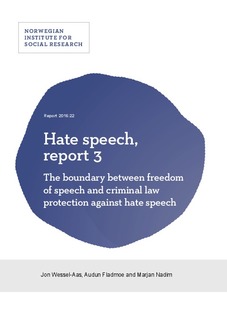| dc.description.abstract | In Norwegian law we have civil anti-discrimination legislation that prohibits discrimination and harassment based on ethnicity, religion, beliefs, disability, gender, sexual orientation, gender identity or gender expression. However, with the exception of the Ethnicity Anti-Discrimination Act, none of these anti-discrimination laws contain a legal basis for penalties for contravention. Our most important penal provision pertaining to hate speech is Section 185 of the Norwegian General Civil Penal Code. Of the above-mentioned grounds for discrimination, the penal provision only includes ethnicity/skin colour/nationality, religion/beliefs, homosexual orientation and disability. Neither sexual orientation in general nor gender and gender identity/expression receive direct criminal law protection against hate speech. However, these categories are still given indirect protection in more general provisions in criminal law.(...) In terms of legal sources, the situation is complex. The interpretation and application of the provisions in the Norwegian General Civil Penal Code must take place in a manner that is compatible with freedom of speech as this is protected in both the Constitution and in international conventions that Norway is bound by, and which have been implemented into Norwegian law through the Human Rights Act, including Article 10 of the European Convention on Human Rights (ECHR). At the same time, Section 98 of the Constitution contains a general equality and non-discrimination principle and Norway also has obligations pursuant to international conventions to combat and, in part, criminalise, certain forms of hate speech. The only explicit obligation to criminalise is found in Article 4 of CERD (UN Committee on the Elimination of Racial Discrimination). This entails that Norway’s legislative room to manoeuvre is most restricted when concerning hate speech based on someone’s ethnicity, skin colour and nationality. However, with regard to the other grounds for discrimination, Norway has more flexibility in terms of whether and to what extent hate speech should be criminalised. Based on a review of the European Court of Human Rights’ (ECtHR) jurisprudence on cases concerning hate speech versus freedom of speech, there is nothing at a general level that indicates that current Norwegian law goes too far in restricting freedom of speech in terms how this is enforced by the ECtHR. | |
